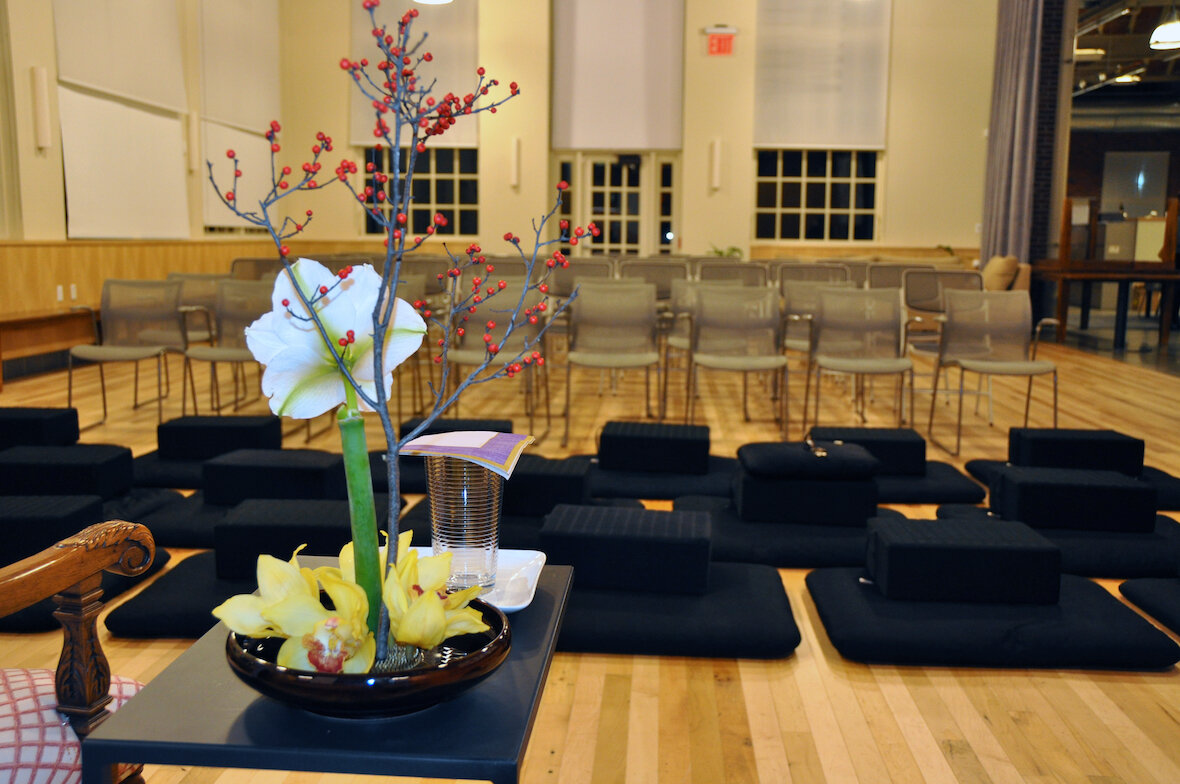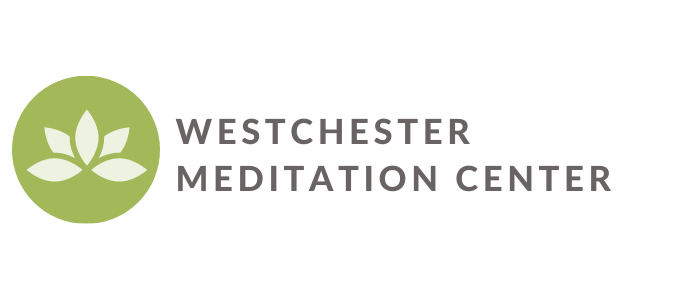
About Westchester Meditation Center
About the Center
Formed in 2009 as the Westchester Buddhist Center (WBC), but now the Westchester Meditation Center (WMC), our organization presents the teachings and meditation practices as transmitted by Chögyam Trungpa, Rinpoche to friends and neighbors in Westchester County, New York.
In addition to dharma talks and meditation sessions, WMC offers in-depth, text-based courses, and periodically hosts visiting Buddhist teachers and other noteworthy speakers, movies and other celebratory events.
Today, WMC is led by Jane and Derek Kolleeny, and Gene Bobker. We emphasize an experiential Buddhism, one focused on ordinary, daily life. New and seasoned practitioners of all traditions are welcome!
Our Path
The Buddhist Path Presented
at the Westchester Meditation Center
This description is of a linear path in the abstract or ideal case. In actual practice, students at differing levels of interest or experience may enter onto such a path at different points and in different ways, and progress differently. This outline is meant as a general guideline—it is intended merely to provide a framework for students to skillfully navigate the different aspects of this path.
Introduction
Westchester Meditation Center (WMC) is a community of students and teachers interested in mindfulness-awareness meditation and the Buddhist path. We welcome new students from any and all backgrounds to our regular weekly gatherings, whether they are just curious about meditation or are already well-versed in Buddhism.
For those wishing to pursue it, WMC now offers an extended path of Buddhist study and practice, beginning with the core practice of sitting meditation and extending through the entire three stages of the Tibetan Buddhist path. The progression of study and practice is based on the teachings of Chögyam Trungpa Rinpoche, who devoted his life to the transmission of the essence of Tibetan Buddhism especially for Western students.
-
Chögyam Trungpa Rinpoche (1939-87)* was a highly-accomplished meditation master, scholar, translator, poet, and artist. He taught extensively in North America during the last seventeen years of his life and authored dozens of books based on hundreds of talks given on a broad array of topics. He left behind a wonderfully complete and detailed collection of instructions on meditation and the entire Tibetan Buddhist path of study and practice, based in the traditions in which he was trained during his exceptionally thorough early education in Tibet.
Trungpa Rinpoche was renowned for his ability to express the detail and nuance of the traditional Indian and Tibetan teachings in fluent English to an American audience and for his attunement to our contemporary culture. He was known for presenting complex psychological ideas with originality, vividness, and humor. He is widely considered to have been a pioneer in transmitting the authentic living dharma to the West.
(*Rinpoche is an honorific used in the Tibetan Buddhist tradition for individuals regarded as accomplished practitioners and teachers.)
The primary goal of WMC is to transmit these profound instructions, genuinely and thoroughly to the next generation, and to ensure they will in turn be transmitted to future generations of students. The introduction of our new foundational curriculum is a turning point in our ability to make these teachings fully available.
Initial Exploration
For those who want to learn about and explore mindfulness meditation, WMC offers meditation instruction, group meditation sessions, and open “dharma talks” on a regular basis. On Sunday Mornings in Irvington and Tuesday Evenings in Bedford we offer an on-going open meditation gathering that includes informal readings and discussions, special events, and public dharma talks. Our public dharma talks emphasize the application of mindfulness and awareness practice to everyday life, and the relevance of traditional Buddhist topics to real-world concerns. These are available to students regardless of religious affiliation, and implies no allegiance to Buddhism per se.
By participating in these regularly, one has access to detailed guidance on “how to meditate” and can gradually experience the real effects that meditation practice can have on daily life. In addition, from time-to-time WMC hosts public dharma talks by well-established teachers representing various “practice” traditions of Buddhism as a way of providing an understanding of the larger Buddhist world and the variety of ways of presenting, understanding and practicing the dharma.
While it is not required, we recommend that students spend at least six months or about a year in this phase of their exploration of our path and community before entering into the next stages. We feel it is important that students should develop some time exploring and gaining an understanding of what we are about before actually entering more formally into our path; this amount of time is appropriate.
Establishing the Foundation
Study: WMC also offers a progressive series of courses on the practices, disciplines and main concepts of Buddhism based on texts by Chogyam Trungpa Rinpoche, as well as texts by his students such as Pema Chodron and other teachers who offer a similar presentation of the dharma. Our Foundation Curriculum begins with a series of three twelve-week long segments called The Way of the Buddha. These are open to all students. While one may even attend on a drop-in basis, since the courses are organized into a sequence with each class building on the preceding one, continued participation is encouraged. These classes are offered on Wednesday evenings both in person at our main Irvington location, the Aligned Center, and online via Zoom.
Practice: In this way, between dharma gatherings, the practice of meditation, and classes, students may attend various sessions during any given week and develop a regular meditation practice individually at home, enhanced by the support of weekly group practice sessions at our three locations. We encourage those interested who are interested in entering into our path to practice meditation with some regularity in order to gain any sort of genuine understanding of it. This usually means 4 to 5 times per week, sessions lasting 15 to 30 minutes or more. However the frequency is much more important than the time, and even 5 to 10 minutes per day is better than one hour session per week.
Formally Entering the Path
Practice: As these two aspects of the path, meditation practice and dharma study, become an integral part of one’s life, a further deepening may be appropriate. WMC provides a vehicle for this deepening in practice by providing the opportunity to work directly with a Meditation Instructor, a senior student who has been on the path for more than ten years and has completed our formal training in study and practice. A personal relationship with a Meditation Instructor can help practitioners stay on track with their practice and understand the challenges that may arise, and the help identify the natural evolution through different phases of meditative experience, as one progresses.
Study: After completing the beginning year of the Foundational Curriculum, one can join the first intermediate course based on the first volume of The Profound Treasury of the Ocean of Dharma. This three-volume set is Trungpa Rinpoche’s most complete presentation of the Buddhist path. They are a distillation of the teachings he gave to students at thirteen annual three-month advanced seminary programs condensed into one continuous body of teachings. These programs were the training vehicle he created to prepare students to enter the Vajrayana path or to become Teachers or Meditation Instructors. Each volume–and Intermediate level course–goes deeply into the view, practice and conduct of one of each of the three stages, or yanas, of the path – Hinayana, Mahayana or Vajrayana. Given the density of these volumes, one must have completed substantial study of the basic concepts prior to engaging in them, such as is provided in the beginning year of the curriculum. Then one can participate in the course on the first volume, focused on the Hinayana view meditation and conduct.
Intention: As one progresses through these stages of practice and study, one may begin to see that the Buddhist path is their personal path and feel it is appropriate to make a formal commitment to this path of practice and study. One can formalize one’s commitment to the Buddhist path by taking Refuge Vows. At the Westchester Meditation Center the requirement for this is a daily practice for at least six months. As well, students may also be inspired to take part in the community aspect of WMC, by supporting our mission with volunteer service, joining our loosely defined team. Our various weekly meetings and our special events where we host other teachers depend entirely upon the efforts of our occasional and regular volunteers.
Deepening One’s Commitment
Intention: Some students at this stage are motivated to approach the spiritual path as something that goes beyond personal development alone, but also necessarily involves the joys and challenges of working with others. They may be inspired to take bodhisattva vows, which mark entry into the Mahayana stage of progression on the path, the very “heart” of this tradition. In addition to continuing to study the vast array of available books on this stage of the path, students would be introduced to traditional practices offered by our teacher, such as the Sadhana of Mahamudra, and Tonglen meditation practice.
Practice: WMC provides a vehicle for this deepening, including the option to work directly with a senior meditation instructor, which is recommended at this stage. A personal relationship with a meditation instructor can help practitioners stay on track with their practice and understand the challenges that may arise, and the help identify the natural evolution through different phases of meditative experience, as one progresses.
Understanding: After completing the foundational curriculum, a student can join the series of Intermediate courses. These courses are based on the Profound Treasury, a three-volume set of Trungpa Rinpoche’s most complete presentation of the Buddhist path. These texts are the distillation of teachings he gave to students at thirteen annual three-month advanced seminary programs, condensed into one continuous body of teachings. Each volume–and Intermediate course–goes much more deeply into each yana or stage of the path, and generally presume that one has completed significant prior study of basic concepts.
Sharing the Teachings
Trungpa Rinpoche encouraged his students to teach as soon as they felt able; to learn how to explain the practice and the teachings to others—both as a way to introduce material to others, and as a way to refine one’s own understanding as a result. In presenting the dharma to others aloud, we gain a clearer measure of our own level understanding, and begin to discover what level of complexity is appropriate to present to newer students. This exercise in re-working one’s understanding by preparing to teach is a form of deeper study that has gone on for dozens of generations of teachers and students, stretching back into the very origins of this tradition.
WMC offers structured training programs for group meditation instructors and assistant dharma teachers, including a course of study and a series of weekend workshops, to those who have been practicing regularly and working with a meditation instructor for at least three years, have completed the study of the Profound Treasury, and have attended at least one week-long retreat.
Entering the Vajrayana Path
Having completed the stages presented above, one can request vajrayana transmission and instruction to begin the vajrayana preliminary practices, or ngondro. WMC has forged relationships with a small group of Tibetan teachers (in particular the Venerable Ringu Tulku Rinpoche) who have an understanding of the subtleties and nuances of Chogyam Trungpa Rinpoche’s transmission and practice of vajrayana, and who have agreed to offer this transmission in that style.
The pinnacle of Chogyam Trungpa Rinpoche’s transmission is his restricted vajrayana teachings and practice instructions. This includes teachings on the vajrayana transmission, the ngondro practices, the fundamental view of vajrayana and its application in our life, as well as detailed practice instructions for ngondro and the sadhanas of Vajrayogini and Chakrasamvara. WMC provides a rigorous path for students who have completed the appropriate preparatory study and practice to access these advanced vajrayana teachings and practices, and currently has a vibrant group of such tantric practitioners.
Our Practice
Our practice is centered around mindfulness and awareness meditation. All courses, dharma talks and community meditations are focused on meditation practice and instruction is always available in person, online, or on this website (as video or narrative).
If you are looking for concise meditation instruction for Shamatha practice, download a PDF here for basic meditation instructions download this PDF here.
Listen to three recordings of detailed instruction given at the Westchester Buddhist Center:
Download detailed instructions on the practice from Meditation in Action (download PDF here). Lastly, download a PDF on the contemplative practice of The Four Immeasurables.
Our Teachers
All teachers emphasize the qualities of experiential Buddhism, which develops as meditation practice deepens and filters into one’s daily life. We take our direction from Chogyam Trungpa, Rinpoche, who was a Tibetan meditation master, scholar, and teacher who interpreted Buddhism for Western lifestyles and minds and who brought the Shambhala Buddhist teachings on creating enlightened society to the West. Learn more.
Our Locations
Sunday meetings at The Aligned Center in Irvington:
The Aligned Center, 1 Bridge Street, Suite 64 (2nd floor), Irvington, NY, 10533
Click here to open in Google Maps
In addition to our main location, WMC presents meditation in several locations throughout Westchester, NY.

